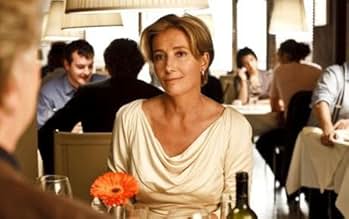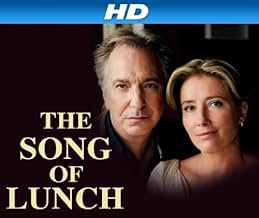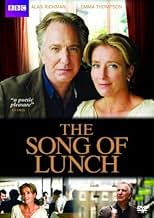The Song of Lunch
- टीवी फ़िल्म
- 2010
- 50 मि
IMDb रेटिंग
7.3/10
2.7 हज़ार
आपकी रेटिंग
अपनी भाषा में प्लॉट जोड़ेंA London publisher recounts a lunchtime reunion with a former lover, in poetic monologue.A London publisher recounts a lunchtime reunion with a former lover, in poetic monologue.A London publisher recounts a lunchtime reunion with a former lover, in poetic monologue.
- निर्देशक
- लेखक
- स्टार
- 1 प्राइमटाइम एमी के लिए नामांकित
- 4 कुल नामांकन
Christian Wolf-La'Moy
- Advertising Guy Talking with Massimo
- (बिना क्रेडिट के)
फ़ीचर्ड समीक्षाएं
Christopher Reed's poem 'The Song of Lunch' is brought brilliantly to life here by Alan Rickman and Emma Thompson, two fine actors and, though like most actors they sometimes waste time (and make money, no doubt) in rubbish, here we see them both at the top of their games. Rickman has the harder role, since he also has to narrate the verse; but Thompson handles herself excellently opposite him, never attempting to claim a larger space than is available but filling what is there perfectly. The story is a classic male tragedy, of a drunken middle-aged man whose awareness of his own increasing unattractiveness is a self-fulfilling prophesy; but the observation and psychology are razor sharp, and the words clear and cutting. It could be thought a bold move to dramatise a poem; but with this level of quality at all levels, perhaps the success of this project was never really in doubt.
10jgw321
It is not easy to transfer poetry to film. Poetry does not tell a story like a simple novel, with the plot explained in logical prose. Instead it approaches the subject sideways; with ideas, hints and suggestions with which, by enrichment from your own experience, you arrive at a shadowy glimpse of something profound about what it is to be human.
This films achieves this in just the same way that a poem does. It is a brilliant film that I could watch over and over again, getting more from it each time. This is because the poem and film are catalysts to the beholder's share, which will be different each time I view as my mood changes, and my experiences grow.
If you don't understand poetry then this film could be rather bleak, since it dwells on ageing, lost love, mortality and similar themes. If you accept that these themes are ever present in our daily lives and we have to come to terms with them, and you understand and enjoy poetry then this is a must see film for you.
This films achieves this in just the same way that a poem does. It is a brilliant film that I could watch over and over again, getting more from it each time. This is because the poem and film are catalysts to the beholder's share, which will be different each time I view as my mood changes, and my experiences grow.
If you don't understand poetry then this film could be rather bleak, since it dwells on ageing, lost love, mortality and similar themes. If you accept that these themes are ever present in our daily lives and we have to come to terms with them, and you understand and enjoy poetry then this is a must see film for you.
He came close to his fantasy, a renewal. But shortly let his mind take him down a trail of various sorts of negativity. He was on that line a bit, a line where he could have been witty and upbeat and challenging, a line he crossed into torpor and, well, annoyance, and more.
Or perhaps He knew something the other reviewers here (and they are a very solid group of reviewers) did not know: That She too wanted a renewal. Though her words bely that possibility, well into the film, she touches his hand in a way that is personal and perhaps a bit erotic. Perhaps in her wonderful life with a successful author and two nondescript kids, she would like to recoup her past with He.
Perhaps He knew this, and sabotaged it. If so, Why?
The subject that screenwriters love to chat about, subtext, comes up. I thought the Mamet fiasco, PHIL SPECTOR, had the characters all delivering subtext as dialogue. Thus there was no mystery. Here, however, the subtext was given us in his unspoken words, his thoughts, as voice-over dialogue in his own head. Perambulating in his skull. It worked.
For Rickman, I find this his second most compelling work, the first being CLOSET LAND (which I saw on a Saturday night in a popular movie theater, but only me in the room for that film). Both works exploit his rich voice.
Or perhaps He knew something the other reviewers here (and they are a very solid group of reviewers) did not know: That She too wanted a renewal. Though her words bely that possibility, well into the film, she touches his hand in a way that is personal and perhaps a bit erotic. Perhaps in her wonderful life with a successful author and two nondescript kids, she would like to recoup her past with He.
Perhaps He knew this, and sabotaged it. If so, Why?
The subject that screenwriters love to chat about, subtext, comes up. I thought the Mamet fiasco, PHIL SPECTOR, had the characters all delivering subtext as dialogue. Thus there was no mystery. Here, however, the subtext was given us in his unspoken words, his thoughts, as voice-over dialogue in his own head. Perambulating in his skull. It worked.
For Rickman, I find this his second most compelling work, the first being CLOSET LAND (which I saw on a Saturday night in a popular movie theater, but only me in the room for that film). Both works exploit his rich voice.
I sat down to watch this for a second time in years and was immediately pulled in again by the clever vitriol of the male character with his witty and brutally honest musings. He is wasted potential personified, recognizing many of his own failings - right up to the point of changing anything, which he refuses to do. It's just easier to curl up around a bitter glass of restaurant chianti and bleat on about how all change is for the worse.
Joining him at the restaurant, the woman breezes into the picture, all lightness and controlled gladness - the picture of elegance and change personified. She is genuinely happy to see him and ready to scoop him into a reminiscence of nostalgic affection but he won't let go of his anger at her leaving him. He refuses to truly see himself and twists their reunion into an internal pity party that manifests in leers and snide comments. And still, he is somehow a sympathetic character (oh thank you, Alan Rickman). You understand her affectionate regard, but also her healthy detachment.
The poem is fascinating and the screenplay adaptation is practically perfect in every way. The beautiful photography and luscious sound editing propels this poem into an incarnate, omnisensory, and very human experience.
Joining him at the restaurant, the woman breezes into the picture, all lightness and controlled gladness - the picture of elegance and change personified. She is genuinely happy to see him and ready to scoop him into a reminiscence of nostalgic affection but he won't let go of his anger at her leaving him. He refuses to truly see himself and twists their reunion into an internal pity party that manifests in leers and snide comments. And still, he is somehow a sympathetic character (oh thank you, Alan Rickman). You understand her affectionate regard, but also her healthy detachment.
The poem is fascinating and the screenplay adaptation is practically perfect in every way. The beautiful photography and luscious sound editing propels this poem into an incarnate, omnisensory, and very human experience.
This film is not going to be for everyone. I knew that just five minutes in. But I loved it. The poem, the dialogue, the acting. Any lesser actors than these two could not have pulled it off. It is heartbreaking, because fairly early in, it becomes clear that someone has a problem and it is this issue, along with other feelings of inadequacy that is the true root of their relationship's demise. What is especially interesting is the fact that the viewer doesn't despise Rickman's character--rather, feels his humiliation and loss.
I gave the film eight stars rather than 10, because unresolved for me is the "WHY" of it. Why does he ask her to meet him for lunch to begin with? Is it to punish her? To rekindle something? Is the scene outside the apartment in Paris meant to illustrate obsession? Why does she agree to meet? Is she just being kind? If so--then why is she so cruel in her assessment of his book? The motivation/impetus for this lunch feels unclear to me.
I gave the film eight stars rather than 10, because unresolved for me is the "WHY" of it. Why does he ask her to meet him for lunch to begin with? Is it to punish her? To rekindle something? Is the scene outside the apartment in Paris meant to illustrate obsession? Why does she agree to meet? Is she just being kind? If so--then why is she so cruel in her assessment of his book? The motivation/impetus for this lunch feels unclear to me.
क्या आपको पता है
- ट्रिवियाThe photo on the dust jacket of the lead female character's husband's book is one of Greg Wise, Dame Emma Thompson's real-life husband.
- कनेक्शनFeatured in The Wright Stuff: एपिसोड #14.45 (2010)
टॉप पसंद
रेटिंग देने के लिए साइन-इन करें और वैयक्तिकृत सुझावों के लिए वॉचलिस्ट करें
विवरण
इस पेज में योगदान दें
किसी बदलाव का सुझाव दें या अनुपलब्ध कॉन्टेंट जोड़ें




























